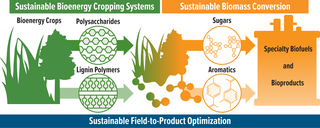Resources for Trainees
GLBRC: Where Biology Meets Innovation
The Great Lakes Bioenergy Research Center (GLBRC) is a U.S. Department of Energy-funded bioenergy research center pioneering breakthrough technologies that can someday transform non-food plant material into fuels, chemicals, and materials.
Whether you're passionate about plant biology, fascinated by microbial engineering, or excited about using AI to solve real-world problems, GLBRC offers a pathway to make an impact through cutting-edge research.
What We Do
We're building the scientific foundation for a new bioeconomy—converting agricultural residues from energy crops into fuels and valuable products. Think jet and other hydrocarbon fuels, specialty chemicals, and materials from switchgrass, energy sorghum, poplar, and miscanthus grown on land that does not compete with food production. We're combining plant and microbial biology with chemistry, computation and engineering to build a new biomanufacturing platform.
Our three research pillars focus on:
- Sustainable Bioenergy Cropping Systems: We engineer resilient energy crops that thrive on non-food lands while maximizing their conversion potential into valuable products.
- Sustainable Biomass Conversion: Our teams design microorganisms that efficiently convert plant materials into biofuels, chemicals, and specialty products.
- Sustainable Field-to-Product Optimization: We use machine learning to optimize the entire pipeline from field to final product, ensuring economic viability.

Why GLBRC?
Six World-Class Universities, One Research Institution
GLBRC connects researchers across the U.S. and Canada:
- University of Wisconsin–Madison
- Michigan State University
- Princeton University
- Texas A&M University
- San Diego State University
- University of British Columbia
Your Background Fits
We're truly interdisciplinary. Whether your expertise is in plant or microbial biology, engineering, chemistry, agricultural sciences, computational fields, or environmental sciences—you'll find a research community where your skills are valued.
Exceptional Resources
Train with $2.6 billion in combined research infrastructure at our 6 institutions, state-of-the-art facilities, and dedicated access to equipment and computational capabilities in U.S. Department of Energy National Labs and user facilities.
Real Impact
Our research generates peer-reviewed publications, patents, launches startups, and can creates new industries. GLBRC's comprehensive research portfolio consistently generates results that can translate scientific breakthroughs into tangible benefits for society. Over 1600 GLBRC alumni have assumed positions in industry, academics, government agencies, technology transfer and elsewhere.
Training & Opportunities
Summer Research for Undergraduates
Paid summer research programs at three locations:
- University of Wisconsin–Madison
- Michigan State University main campus
- Michigan Statue University Kellogg Biological Station
Institutional Postbaccalaureate Opportunities
You can find information about UW-Madison and Michigan State University postbaccalaureate research opportunities at the links below.
University of Wisconsin-Madison
Michigan State University
GLBRC Research Intern positions
- Other positions are posted periodically on the Careers page
Graduate Opportunities
GLBRC benefits from access to graduate students from world-class programs at our home institutions. Graduate students become part of the center and work on center research through their GLBRC-associated primary research advisor. You can identify potential advisors on our Co-Investigators pages. Check their webpages for departmental and graduate program information, and use that information to determine graduate programs of interest that you will apply to.
Postdoctoral Opportunities
When GLBRC has open postdoctoral positions that are actively being recruited, you can find them on the Careers page. However, many postdoc opportunities are arranged directly with faculty members, even when no formal job posting exists.
If you're interested in a postdoctoral position:
- View our co-investigators directory for possible mentors that can provide training in a field of interest.
- Look for openings on our Careers page.
- Reach out to GLBRC faculty. Include the following in your email:
- A cover letter explaining your background, research interests, and why you're interested in that faculty member's work.
- Your CV. It might be a good idea to include names of your thesis advisor and people who will provide letters of reference.
We encourage proactive outreach and welcome inquiries from researchers with varied backgrounds and interests.
Develop Yourself
GLBRC and its home campuses provide extensive support for you and your professional needs.
Professional Development
- Communication, grant writing, and teaching workshops
- One-on-one career coaching
- Conference presentation opportunities
- Structured mentorship program
- Leadership and outreach opportunities
- Recognition awards
Entrepreneurship Support
- Entrepreneurship training programs
- Technology transfer partnerships
- Industry networking
- Business competition support
Your Future Starts at GLBRC!
Join a collaborative community at the forefront of biotechnology. Gain skills that employers value. Contribute to cutting-edge research that creates new industries. Build a network that will support your career for years to come.
To keep up to date on activities at GLBRC, sign up for our newsletter.
If you would like to be directly emailed every time we have a training opportunity, please sign up for our Training Opportunities Mailing List.
Have questions? Need more information? Contact us at workforce@energy.wisc.edu!